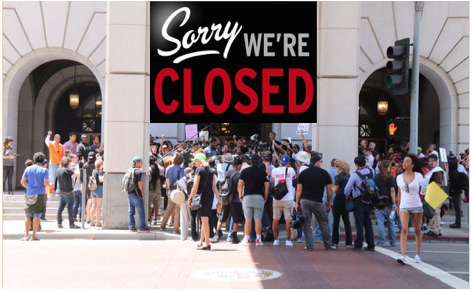CommentsLA WATCHDOG--Why are Councilmembers Paul Krekorian, the Chair of the Budget & Finance Committee, and Paul Koretz, the Chair of the Personnel Committee, and Mayor Eric Garcetti unwilling to be transparent about the City’s pension crisis that contributes to its never ending Structural Deficit and is crowding out basic services to Angelenos?
Our friends who occupy City Hall tell us that they are addressing the $9 billion unfunded liability of the City’s two pension plans and the ever increasing pension contributions that now consume almost 20% of the City’s budget.
In 2011, voters approved a new, lower cost pension tier for newly hired cops and firefighters. And as of 2016, newly hired civilian employees will go into a less generous pension tier. These “reforms” resulted in very modest savings for the City.
The City is also requiring employees to contribute to a fund to finance their post-retirement medical benefits.
[As an aside, as a result of decisions made in the late 1980’s, the City has funded 65% of its $6.3 billion of Other Post Retirement Employment Benefits. This compares to the County and the State that have not funded any of these benefits and are on a very expensive pay-as-you go basis.]
Over the objections of Krekorian and Koretz, the trustees of the two pension plans stepped up to the plate, followed the recommendations of the actuaries, and lowered the investment rate assumptions to 7¼% from 7½%. This will require higher pension contributions because of the need to amortize the increased unfunded liability.
City Hall is also giddy over last year’s 13% investment return on its $36 billion portfolio of stocks and bonds. This return, which exceeded the investment rate assumption, reduced the unfunded pension liability by $700 million to $8.9 billion (80% funded). And this was after a $1.1 billion hit related to the lowering of the investment rate assumptions to 7¼%.
Despite what the City Hall spinmeisters tell us, the City’s two underfunded pension plans are a major league problem. Annual pension contributions will continue to increase at rate that exceeds the growth in revenues. And the unfunded pension liability will continue to grow, burdening the next two or three generations of Angelenos.
The City is still relying on the overly optimistic investment rate assumption of 7¼%. This compares to CalPERS projected 6.2% return. If this differential occurs, the City’s unfunded pension liability will increase by an estimated $6 billion over the next ten years.
If the City lowered its investment rate assumption to 6.2%, the CalPERS projected rate of return, the unfunded pension liability would jump by two-thirds to $15 billion, lowering the funded ratio to an unhealthy 71%. Pension contributions would also increase by $400 to $500 million a year, blowing a hole in the City’s budget as pension contributions would devour over 25% of the City’s budget.
There are no easy solutions to the City’s pension crisis. Our Elected Elite will do nothing as they are beholden to the campaign funding leaders of the City’s public unions who will fight any meaningful reform. The California Rule that springs from a State Supreme Court ruling prohibits, for the time being, any meaningful changes that impact current employees. And as pension contributions and salary increases continue to increase faster than revenues, the City will continue to cut vital services to eliminate the Structural Deficit.
Should the City raise taxes to cover the pension liabilities? Should the City say no to future raises for its employees, including the police, to pay for the pensions? Should the City downsize its work force and rely on independent contractors? Should the city adopt a defined contribution plan for its employees, similar to the plans in the private sector? Should the City try to terminate its existing plans and convert all employees to a defined contribution plan as recommended by the Little Hoover Commission?
Rather than speculate, the City should follow the recommendation of the LA 2020 Commission and establish a Commission for Retirement Security to review and analyze the City’s pension plans and develop recommendations on how to achieve equilibrium on retirement costs over the next five years. The Commission should also consider how to eliminate the pension liability so as not to burden the next generations of Angelenos.
(Jack Humphreville writes LA Watchdog for CityWatch. He is the President of the DWP Advocacy Committee and is the Budget and DWP representative for the Greater Wilshire Neighborhood Council. He is a Neighborhood Council Budget Advocate. He can be reached at: [email protected].)
-cw














